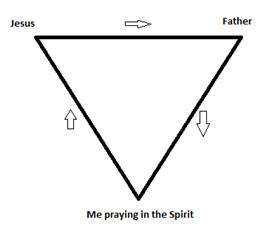Mayflower
Active
- Joined
- Mar 21, 2021
- Messages
- 1,027
@JerryfromMass
@Rhema
I thought this would be a great discussion. I would love for us to explore this some. Jerry and Rhema were talking about prayer and how to pray. So thoughts and scriptures. Do you pray only to the Father? Do you address Jesus and Holy Spirit in prayer also, or the Father in Jesus Name alone.
My view is that I mainly pray to the Father in Jesus Name, but I will have interjections. Where I am praising Jesus directly and asking Him things directly, and Holy Spirit, praising and directing prayer to Him. I'll pray in tongues also. I believe in the Holy Trinity. God is not dead, He is surely alive, so I praise Him in all ways and in all regards. It is okay to ask any part of the God head for anything in prayer, because Holy Spirit is Spirit of God, and and Jesus is God's son and God in bodily form. While I mainly read and add scripture and thoughts here and there, I will start off with the prayer Jesus taught the disciples.
“When you pray, don’t be like the hypocrites who love to pray publicly on street corners and in the synagogues where everyone can see them. I tell you the truth, that is all the reward they will ever get. But when you pray, go away by yourself, shut the door behind you, and pray to your Father in private. Then your Father, who sees everything, will reward you. “When you pray, don’t babble on and on as the Gentiles do. They think their prayers are answered merely by repeating their words again and again. Don’t be like them, for your Father knows exactly what you need even before you ask him! Pray like this: Our Father in heaven, may your name be kept holy. May your Kingdom come soon. May your will be done on earth, as it is in heaven. and forgive us our sins, as we have forgiven those who sin against us. And don’t let us yield to temptation, but rescue us from the evil one. “If you forgive those who sin against you, your heavenly Father will forgive you. But if you refuse to forgive others, your Father will not forgive your sins.
Matthew 6:5-10, 12-15 NLT
@Rhema
I thought this would be a great discussion. I would love for us to explore this some. Jerry and Rhema were talking about prayer and how to pray. So thoughts and scriptures. Do you pray only to the Father? Do you address Jesus and Holy Spirit in prayer also, or the Father in Jesus Name alone.
My view is that I mainly pray to the Father in Jesus Name, but I will have interjections. Where I am praising Jesus directly and asking Him things directly, and Holy Spirit, praising and directing prayer to Him. I'll pray in tongues also. I believe in the Holy Trinity. God is not dead, He is surely alive, so I praise Him in all ways and in all regards. It is okay to ask any part of the God head for anything in prayer, because Holy Spirit is Spirit of God, and and Jesus is God's son and God in bodily form. While I mainly read and add scripture and thoughts here and there, I will start off with the prayer Jesus taught the disciples.
“When you pray, don’t be like the hypocrites who love to pray publicly on street corners and in the synagogues where everyone can see them. I tell you the truth, that is all the reward they will ever get. But when you pray, go away by yourself, shut the door behind you, and pray to your Father in private. Then your Father, who sees everything, will reward you. “When you pray, don’t babble on and on as the Gentiles do. They think their prayers are answered merely by repeating their words again and again. Don’t be like them, for your Father knows exactly what you need even before you ask him! Pray like this: Our Father in heaven, may your name be kept holy. May your Kingdom come soon. May your will be done on earth, as it is in heaven. and forgive us our sins, as we have forgiven those who sin against us. And don’t let us yield to temptation, but rescue us from the evil one. “If you forgive those who sin against you, your heavenly Father will forgive you. But if you refuse to forgive others, your Father will not forgive your sins.
Matthew 6:5-10, 12-15 NLT
